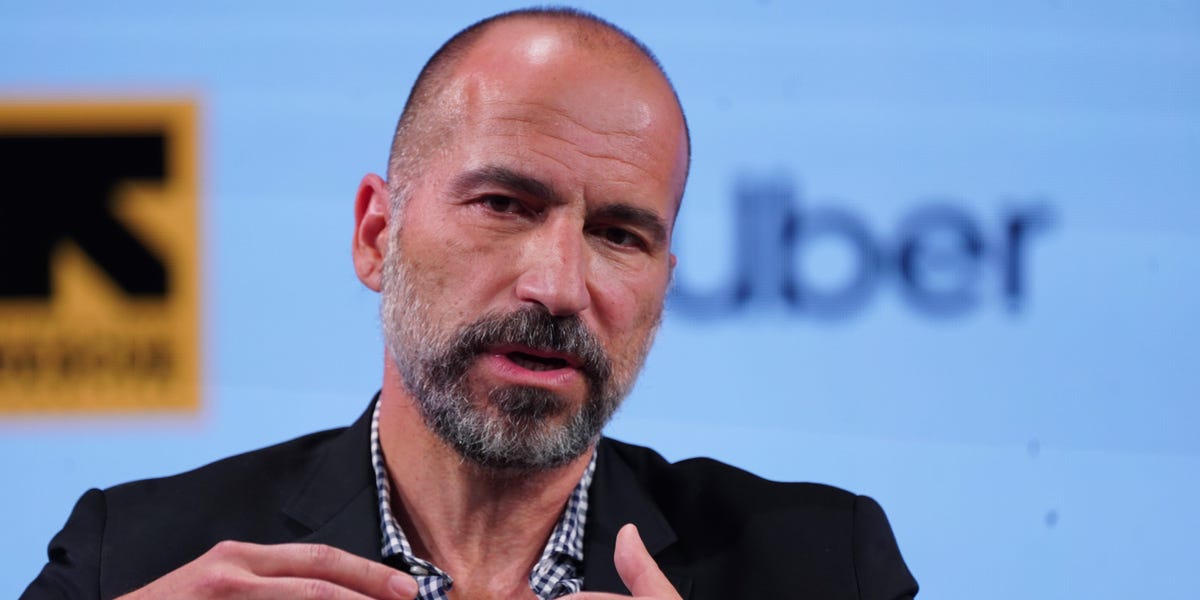- Uber finally did it: it turned an annual profit.
- The company said Wednesday it made an operating profit of $1.1 billion in 2023.
- After years of burning up billions, Uber has Dara Khosrowshahi to thank for its change in fortune.
Who knows what kind of fate would have awaited Uber had Travis Kalanick decided not to relinquish his power in 2017.
Even by Silicon Valley standards, the cofounder and ex-CEO of the ride-hailing company was an unpredictable disruptor — willing to burn through billions of dollars, attempt sabotage of rivals like Lyft, and reportedly normalize bro culture at work.
But instead of crashing, Uber has seemingly defied the odds thanks to Kalanick’s successor, Dara Khosrowshahi.
On Wednesday, Uber announced its first annual operating profit in what Khosrowshashi described as “an inflection point” in the San Francisco-based company’s near-15 year history.
With an average of about 26 million Uber trips taken a day last year, operating profit for 2023 reached $1.1 billion compared to a $1.8 billion loss the previous year. Net profit for the year hit $1.9 billion versus an enormous $9.1 billion loss in 2022, which had been inflated by revaluations of Uber’s equity investments.
It’s a milestone achievement for the company after it first went public in 2019 in an IPO that saw it fall far short of the $100 billion valuation it once dreamed of.
Dara’s strategy pays off
Khosrowshahi had his work cut out in rehabilitating the public image of the company as one prone to chaos and excess in the Kalanick years. He also had to oversee an existential threat during the pandemic as lockdown measures almost wiped out bookings.
But having been at the helm of online travel business company Expedia for 12 years before moving to Uber, Dara’s success appears to come from his pedigree as an operator.
“Dara clearly didn’t come with a founder mentality, but with an operator one,” Gergely Orosz, software engineer and author of The Pragmatic Engineer newsletter wrote on X.
“Lots of people didn’t like his style (still don’t like it). But he managed to get done what no other ridesharing or food delivery company did.”
Being an operator has meant making difficult decisions. Fares are no longer as cheap as they were during the early days when billions of dollars from venture capital investors like SoftBank helped subsidize low-cost rides.
Khosrowshahi has also made big decisions to cut Uber’s exposure to more speculative bets, such as involvement in China, where he offloaded a stake in Didi Chuxing in 2021, five years after Uber sold its operations there to the Chinese taxi firm.
In turn, he has overseen the launch of products like Uber One, a membership program made available in 2021 to entice users into more regular app engagement by offering zero delivery fees for food orders, for example. With deliveries up 19% in the final quarter of 2023, it seems to be working.
Internally, the Uber chief has also tried to exercise discipline with spending. It laid off 200 people in its recruitment team last year, and adopted an “even more rigorous” approach to performance reviews. Uber also culled its head count by around 17% during the pandemic.
The confidence at Uber is so great now that the company could be gearing up to announce capital allocation plans during the company’s investor day next week. Khosrowshahi has hinted what that might involve, having signaled share buyback plans since September.
The Kalanick years could start to feel like a distant memory.
Read the full article here





